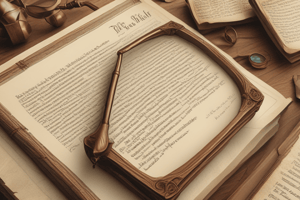Podcast
Questions and Answers
What is the primary role of judges in the legal system?
What is the primary role of judges in the legal system?
- Provide legal advice and representation
- Preside over court proceedings and make rulings (correct)
- Study and analyze laws and legal systems
- Assist lawyers with research and documentation
What is the main purpose of mediation in legal disputes?
What is the main purpose of mediation in legal disputes?
- To request a higher court to review a decision
- To take legal action in court
- To involve a neutral third party in resolving issues (correct)
- To provide a binding resolution
Which of the following best describes arbitration?
Which of the following best describes arbitration?
- A binding dispute resolution outside of court (correct)
- An informal discussion aimed at resolution
- An academic analysis of legal systems
- Taking legal action in a federal court
What trend is influencing legal practices due to advancements in technology?
What trend is influencing legal practices due to advancements in technology?
What has been an increasing focus in global law concerning individual rights?
What has been an increasing focus in global law concerning individual rights?
What is the primary purpose of law in maintaining order in society?
What is the primary purpose of law in maintaining order in society?
Which type of law deals primarily with offenses against the state or public?
Which type of law deals primarily with offenses against the state or public?
Which of the following is NOT a source of law?
Which of the following is NOT a source of law?
Which legal system is based on judicial precedent and case law?
Which legal system is based on judicial precedent and case law?
What does the principle of 'due process' ensure in legal proceedings?
What does the principle of 'due process' ensure in legal proceedings?
Which purpose of law is aimed at safeguarding individual freedoms and property?
Which purpose of law is aimed at safeguarding individual freedoms and property?
What principle states that laws should be clear, publicized, and stable?
What principle states that laws should be clear, publicized, and stable?
In which type of law would you find regulations governing the activities of governmental agencies?
In which type of law would you find regulations governing the activities of governmental agencies?
Study Notes
Definition of Law
- Set of rules and guidelines, enforced through social institutions.
- Governs behavior within a society, establishing standards of conduct.
Purposes of Law
- Maintain Order: Preventing chaos and disputes in society.
- Protect Rights and Liberties: Safeguarding individual freedoms and property.
- Resolve Disputes: Providing mechanisms for conflict resolution.
- Promote Social Justice: Ensuring fairness and equality before the law.
- Facilitate Social Change: Allowing for adaptation of legal standards over time.
Types of Law
- Criminal Law: Deals with offenses against the state or public.
- Civil Law: Governs disputes between individuals or organizations.
- Administrative Law: Regulates the activities of governmental agencies.
- Constitutional Law: Covers the interpretation of the constitution and its amendments.
- International Law: Governs relationships between countries.
Sources of Law
- Constitutions: Foundational legal documents of a state.
- Legislation: Laws passed by legislatures (statutes).
- Judicial Decisions: Court rulings that interpret laws (case law).
- Administrative Regulations: Rules created by government agencies.
- Customary Practices: Traditions that influence legal frameworks.
Legal Systems
- Common Law: Based on judicial precedent and case law (e.g., the United States, UK).
- Civil Law: Based on written codes and statutes (e.g., France, Germany).
- Religious Law: Based on religious texts (e.g., Sharia law in Islamic countries).
- Mixed Systems: Combines elements from different legal traditions.
Legal Principles
- Rule of Law: Principle that law applies equally to all individuals.
- Due Process: Right to fair legal proceedings.
- Presumption of Innocence: A defendant is considered innocent until proven guilty.
- Legal Certainty: Laws should be clear, publicized, and stable.
Legal Professionals
- Lawyers: Provide legal advice and representation.
- Judges: Preside over court proceedings and make rulings.
- Paralegals: Assist lawyers with research and documentation.
- Legal Scholars: Study and analyze laws and legal systems.
Legal Procedures
- Litigation: Process of taking legal action in court.
- Mediation: Alternative dispute resolution involving a neutral third party.
- Arbitration: Binding resolution of disputes outside of court.
- Appeals: Request for a higher court to review a lower court's decision.
Current Trends in Law
- Technology and Law: Impact of digital technology on legal practices (e.g., e-discovery, data privacy).
- International Law Developments: Globalization and its effect on sovereign laws.
- Human Rights Law: Growing emphasis on protecting individual rights globally.
- Environmental Law: Increasing regulations to address climate change and protect natural resources.
Definition of Law
- Law consists of rules and guidelines that govern behavior in society and are enforced by social institutions.
Purposes of Law
- Maintain order by preventing chaos and disputes within society.
- Protect individual rights and liberties, including freedoms and property.
- Resolve disputes through established mechanisms to ensure fairness.
- Promote social justice, fostering equality before the law.
- Facilitate social change, allowing legal standards to evolve with society's needs.
Types of Law
- Criminal Law addresses offenses against the state or public.
- Civil Law governs conflicts between individuals or organizations.
- Administrative Law regulates the functions and powers of governmental agencies.
- Constitutional Law involves the interpretation and application of the constitution and its amendments.
- International Law manages relationships and agreements between nations.
Sources of Law
- Constitutions serve as the foundational legal documents for a state.
- Legislation includes statutes passed by legislative bodies.
- Judicial Decisions create case law through court interpretations of existing laws.
- Administrative Regulations are rules developed by government agencies to enforce laws.
- Customary Practices influence legal frameworks through established traditions.
Legal Systems
- Common Law is derived from judicial precedent and case law, prominent in places like the U.S. and U.K.
- Civil Law relies on comprehensive written codes and statutes, typical in countries like France and Germany.
- Religious Law is based on religious texts; for example, Sharia law governs in Islamic contexts.
- Mixed Systems incorporate elements from various legal traditions.
Legal Principles
- The Rule of Law ensures that laws apply equally to all individuals without discrimination.
- Due Process guarantees the right to fair legal proceedings and protections.
- The Presumption of Innocence states that a defendant is not guilty until proven otherwise.
- Legal Certainty emphasizes the need for laws to be clear, publicized, and consistent over time.
Legal Professionals
- Lawyers provide essential legal advice, representation, and advocacy for clients.
- Judges oversee court proceedings and deliver impartial rulings based on law.
- Paralegals support lawyers by conducting legal research and preparing documents.
- Legal Scholars engage in the study and analysis of laws and legal systems, contributing to academic discourse.
Legal Procedures
- Litigation refers to the process of bringing and contesting legal claims in court.
- Mediation offers a way to resolve disputes with the help of a neutral third party facilitating communication.
- Arbitration provides a binding resolution process to settle disputes outside of traditional court settings.
- Appeals allow parties to seek a higher court's review of a lower court's decision for potential reversals or modifications.
Current Trends in Law
- Technology is reshaping legal practices, including electronic discovery and data privacy concerns.
- International Law is evolving due to globalization, affecting how sovereign laws are crafted and implemented.
- The importance of Human Rights Law is rising, focusing on the protection of individual rights across nations.
- Environmental Law is becoming increasingly prominent as regulations grow to mitigate climate change and conserve natural resources.
Studying That Suits You
Use AI to generate personalized quizzes and flashcards to suit your learning preferences.
Description
Explore the fundamental concepts of law, including its definition, purposes, types, and sources. This quiz highlights how law maintains order, protects rights, resolves disputes, promotes justice, and facilitates social change. Test your understanding of these essential legal principles.




